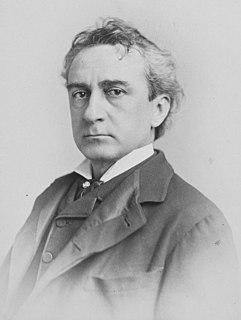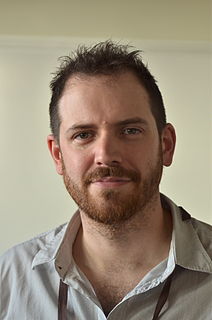A Quote by Robert Louis Stevenson
Strange as my circumstances were, the terms of this debate are as old and commonplace as man; much the same inducements and alarms cast the die for any tempted and trembling sinner; and it fell out with me, as it falls with so vast a majority of my fellows, that I chose the better part and was found wanting in the strength to keep to it.
Related Quotes
Like the vast majority of Americans, I've opposed same-sex marriage, but I've also opposed unjust discrimination against anyone, for racial or religious reasons, or for sexual preference. Americans are a tolerant, generous, and kind people. We all oppose bigotry and disparagement. But the debate over same-sex marriage is not a debate over tolerance. It is a debate about the purpose of the institution of marriage and it is a debate about activist judges who make up the law rather than interpret the law.
In ability choice education finance majorities people understanding voting A lot of voters always cast their ballot for the candidate who seems to them to be one of the people. That means he must have the same superstitions, the same unbalanced prejudices, and the same lack of understanding of public finances that are characteristic of the majority. A better choice would be a candidate who has a closer understanding and a better education than the majority. Too much voting is based on affability rather than on ability.
The god which the vast majority of professing Christians love is looked upon very much like an indulgent old man, who himself has no relish for folly, but leniently winks at the indiscretions of youth...For one sin God banished our first parents from Eden; for one sin all the posterity of Canaan fell under a curse which remains over them to this day; for one sin Moses was excluded form the promised land; Elisha’s servant smitten with leprosy; Ananias and Sapphira were cut off from the land of the living.
Maybe the first time you saw her you were ten. She was standing in the sun scratching her legs. Or tracing letters in the dirt with a stick. Her hair was being pulled. Or she was pulling someone's hair. And a part of you was drawn to her, and a part of you resisted--wanting to ride off on your bicycle, kick a stone, remain uncomplicated. In the same breath you felt the strength of a man, and a self-pity that made you feel small and hurt. Part of you thought: Please don't look at me. If you don't, I can still turn away. And part of you thought: Look at me.
I was a kid when I read Jane Eyre and fell in love with that universe. I didn't have the acumen to say the prose is old or the prose is too complex. I just fell in love with Jane's very lonely soul, much the same way I fell in love with Frankenstein's creature for the same reason. Those old souls exist in every decade in every century.
When an old man and a young man work together, it can make an ugly sight or a pretty one, depending on who's in charge. If the young man's in charge or won't let the old man take over, the young man's brute strength becomes destructive and inefficient, and the old man's intelligence, out of frustration, grows cruel and inefficient. Sometimes the old man forgets that he is old and tries to compete with the young man's strength, and then it's a sad sight. Or the young man forgets that he is young and argues with the old man about how to do the work, and that's a sad sight, too.
Useless pursuits and conversations always about the same things absorb the better part of one's time, the better part of one's strength, and in the end there is left a life grovelling and curtailed, worthless and trivial, and there is no escaping or getting away from it—just as though one were in a madhouse or prison.
Cities are responsible for the vast majority of the creation of the economy. They're also places into which we pour the vast majority of resources, the vast majority of energy and the places where a huge percentage of the decisions about how systems are built and how products designed, etc., happen.
There's managers out there now who would love to have won a single trophy. The fact is the vast majority of them haven't. So I'm quite cool about what I did as a player and as a manager. Could I have done better, or differently? Of course. But that's all water that has flowed under the bridge; it doesn't cause me any sleepless nights.







































